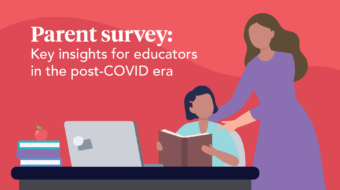
Becoming an independent telepractitioner can be surprising. If you’ve never provided speech-language therapy, occupational therapy, or mental health services online, you may be surprised by its effectiveness, despite having read the research. You might be surprised to be “virtually” surrounded by hundreds of other clinicians. And you might be surprised by how well you can still connect with students. Corinne Nordin, who has been working as an independent contractor SLP with PresenceLearning since 2013, discussed some of these revelations in a recent interview.
Corinne, we are so happy to have you on the team, and thank you for all that you do!
Q: Let’s start off with one of my favorite questions. SLPs have the opportunity to work with so many kids over their careers. Can you tell me about a student you’ve worked with online who has inspired you in some way?
A: I am currently working with a student who is in the 11th grade. He is such a sweet, ambitious young man. During our last session, he was able to write a full three-paragraph essay. We used graphic organizers to organize his thoughts prior to the assignment, but he completed it independently. When I reiterated how well he did and said, “Look at what you wrote by yourself,” his smile gleamed. He couldn’t wait to show his mother what he did. Seeing how proud and capable he was warmed my heart for days.
Q: Switching gears, you’ve been doing telepractice for a few years now. What do you think is the key to to being a telepractitioner?
A: Being flexible with the students and finding subject matter that they can relate to. It is also important to help them realize how therapy is helpful for them.
Q: What do you think is the key / are the keys to being a successful telepractitioner?
A: I think that just like any mode of delivery for therapy, establishing a good rapport with your students, their families, and your school staff colleagues is crucial to being successful. You can’t let being hundreds of miles apart deter you from connecting with the people you work with.
Q: What led you to trying telepractice with PresenceLearning?
A: I came across telepractice accidentally, when I was asked to teach an online college course. After hearing what “telepractice” entailed, I felt I wanted to know more. I wanted to be part of the “up and coming.” I am so happy I did.
Q: What do you love the most about your career?
A: I love the diversity of speech-language therapy. There are so many areas of language or speech to cover. We can work on articulation, social skills, and language skills with various clientele in various settings. I love making a difference in someone’s life, especially in his/her ability to communicate effectively.
Q: What has surprised you the most about working online?
A: I was surprised to find how effective telepractice was. I couldn’t believe the results from working with a child with articulation difficulties. Before trying telepractice, I felt that this work had to be accomplished in a face-to-face setting. I was pleasantly surprised how telepractice could be used to effectively treat articulation disorders.
Q: How has the PresenceLearning community benefited you as an SLP?
A: It has allowed me to be in touch with so many therapists around the country, whereas I wouldn’t have been able to do that so easily in another setting.
Q: What do you like best about the PresenceLearning therapy solution?
A: I like that I am able to find new material with a click of a button, instead of reading through tons of books.
Q: What would you tell other clinicians who are thinking about trying telepractice with PresenceLearning?
A: I would tell them to keep an open mind. It really is effective and a great way to reach children from all over the country.



